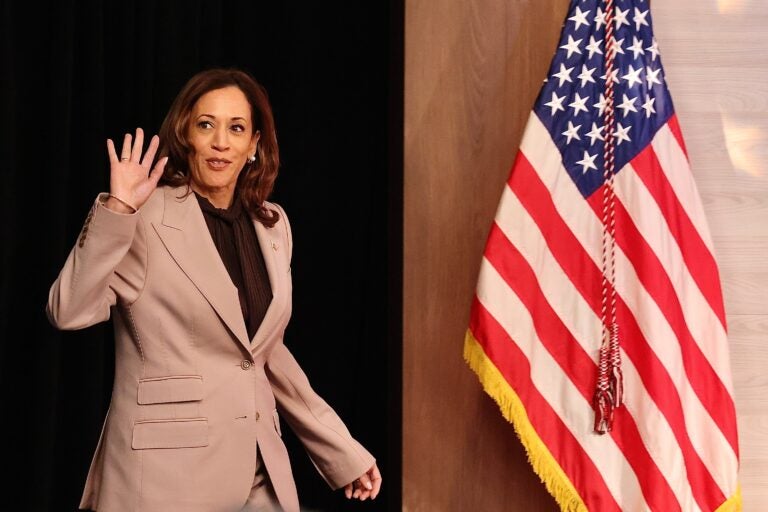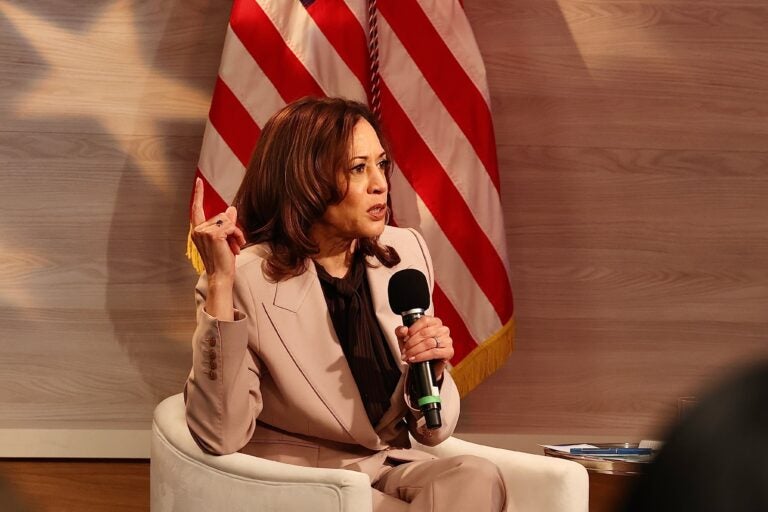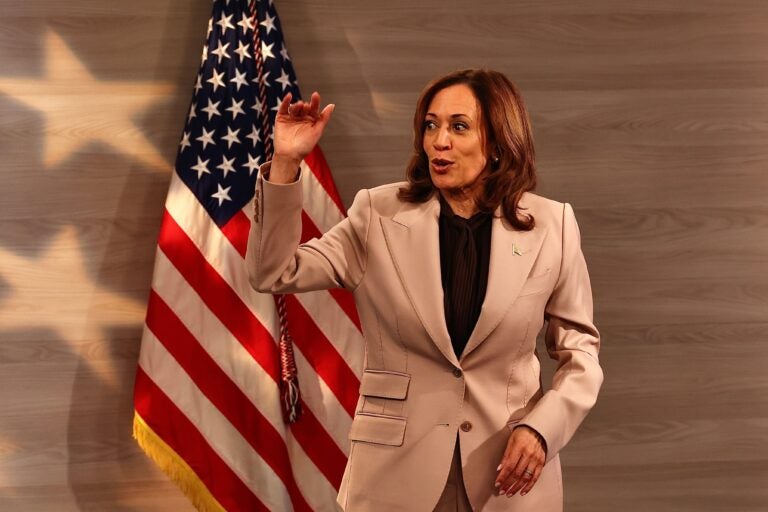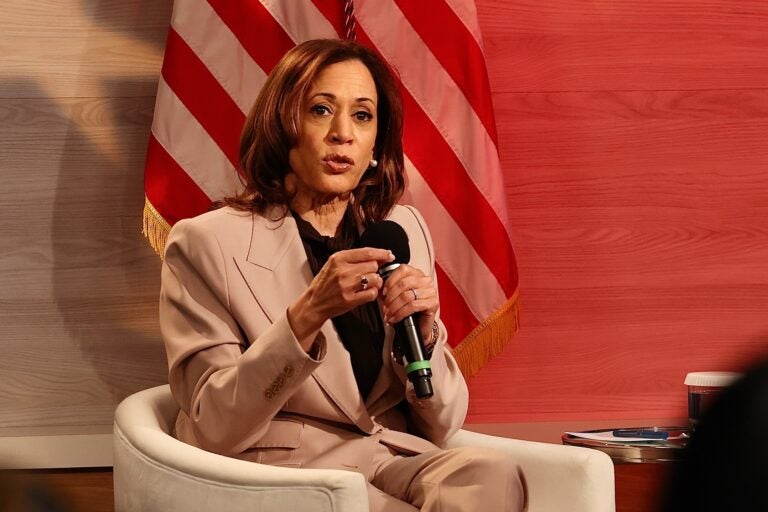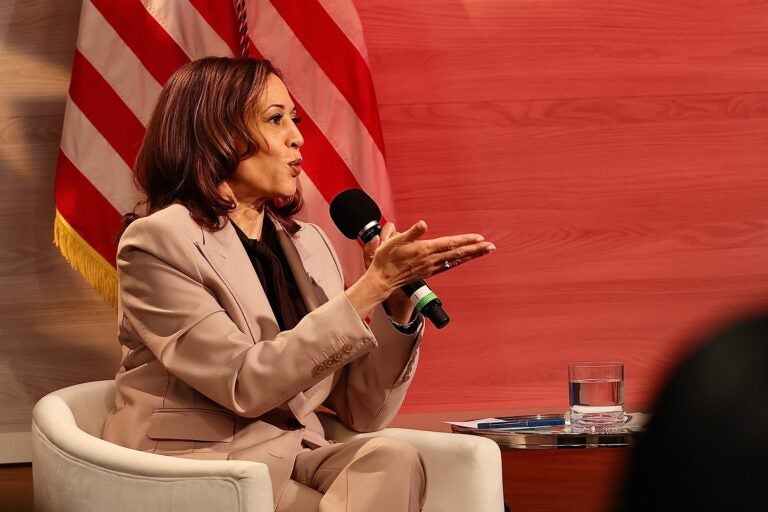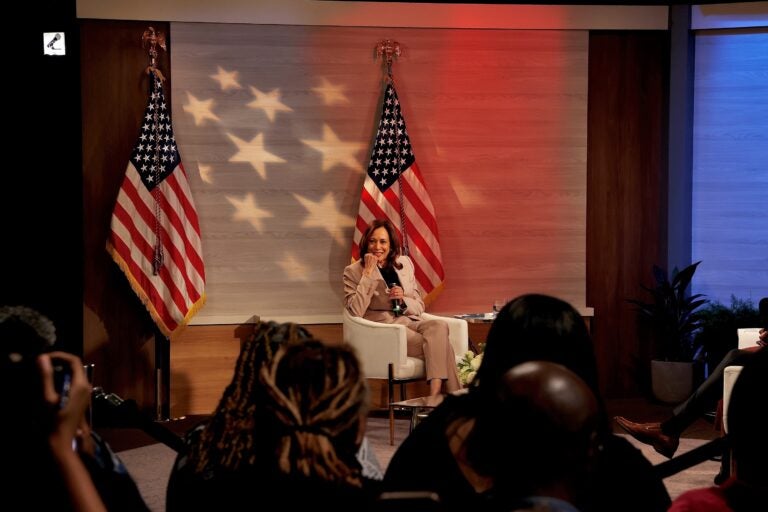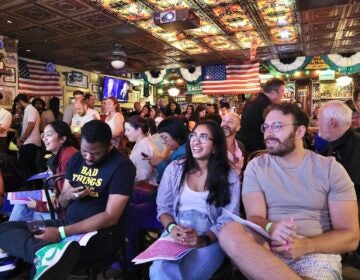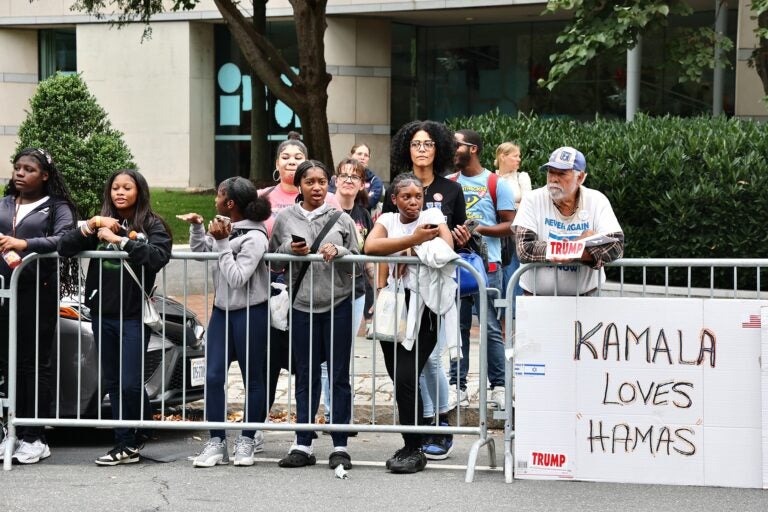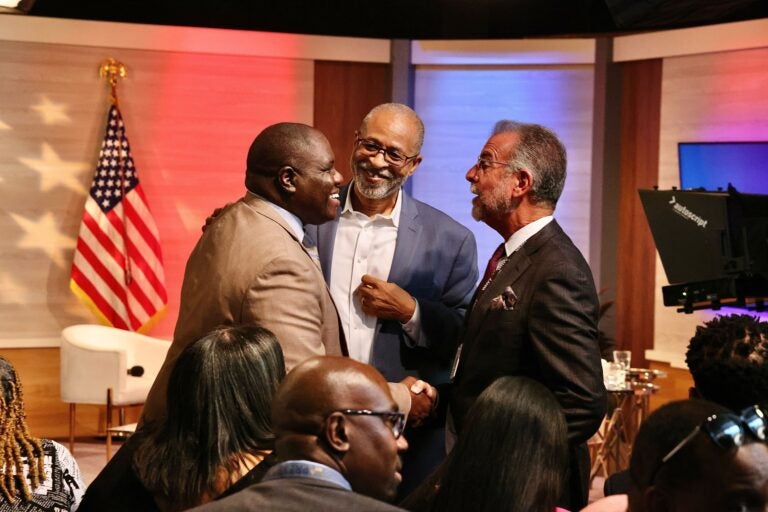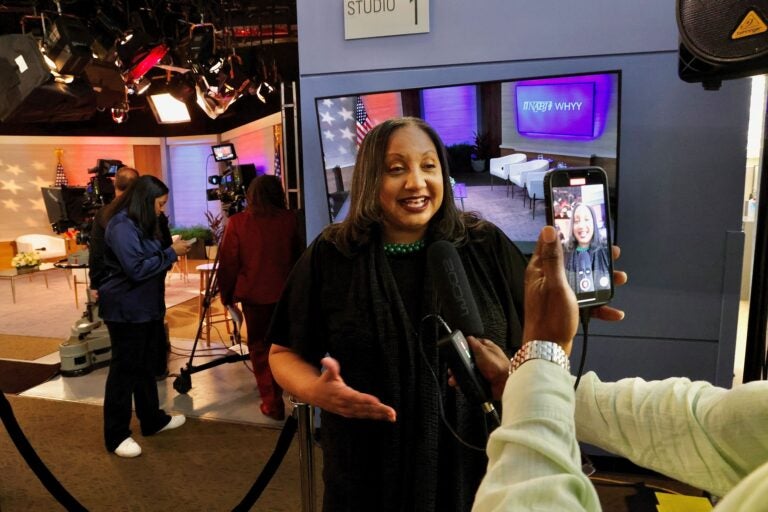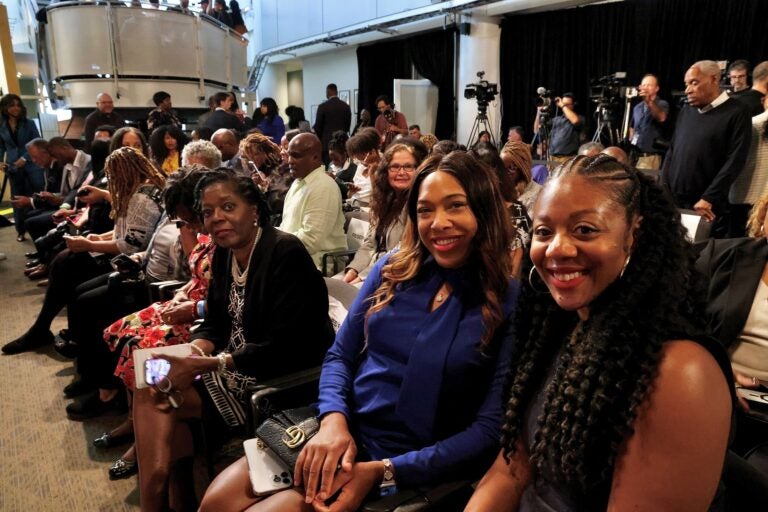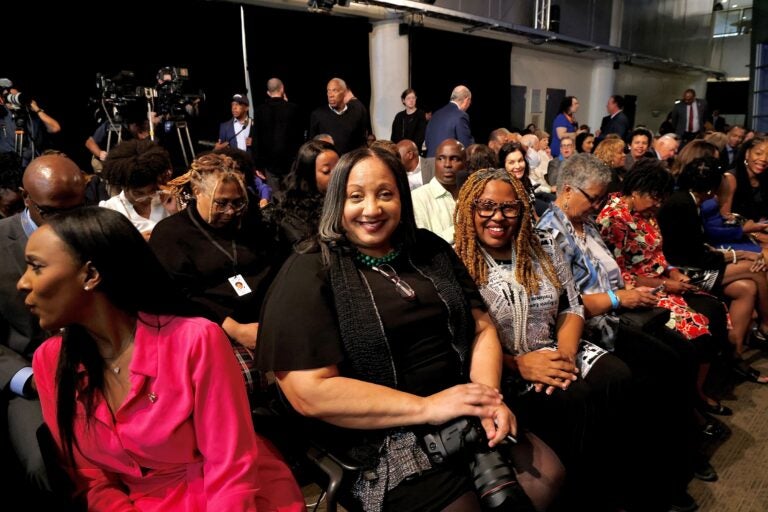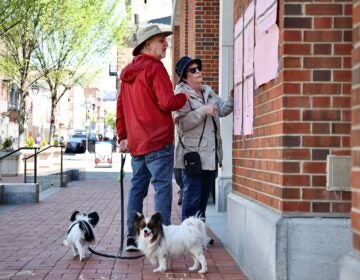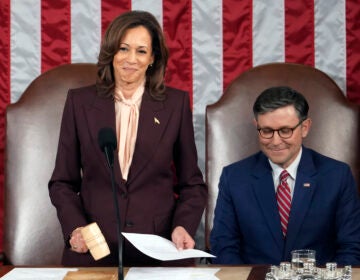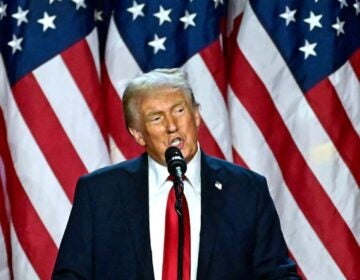WHYY hosts Kamala Harris, NABJ for presidential candidate interview
Harris faced a three-person panel and answered questions on a range of topics including the economy, Gaza, reparations and reproductive health rights.
Listen 1:04What questions do you have about the 2024 elections? What major issues do you want candidates to address? Let us know.
Vice President Kamala Harris took the stage at WHYY in a panel discussion with the National Association of Black Journalists Tuesday. It was Harris’ latest visit to the state this year, with the Democratic nominee most recently taking part in the presidential debate against Republican nominee Donald Trump at the National Constitution Center just across the street.
“It is good to be with the National Association of Black Journalists, and I thank you for the work you do and that your members do every day,” Harris told the panelists.
Tonya Mosley, co-host of WHYY’s “Fresh Air With Terry Gross and Tonya Mosley,” led the discussion. Joining her were Gerren Keith Gaynor, White House correspondent and managing editor of politics at TheGrio, and Eugene Daniels, Playbook co-author and White House correspondent for POLITICO.
Harris answered questions related to the economy, the war in Gaza, gun violence, race relations, reproductive health rights and political violence.
Daniels started the discussion with an election coverage standard when he asked, “Are [Americans] better off now than they were four years ago?”
“Four years ago when we came in, we came in during the worst unemployment since the Great Depression,” Harris responded. “We came in during the worst public health epidemic in centuries. We came in after the worst attack on our democracies since the Civil War. And a lot of it due in large part to the mismanagement by the former president as it relates to COVID and obviously January 6th.”
She touted that the Biden-Harris administration created 16 million jobs, including 800,000 manufacturing jobs. Politifact, which was fact-checking the discussion in real-time, added context to the response, explaining that many of those jobs reflected workers returning to jobs they lost during the COVID crisis but that the number is still 173,000 more than before the pandemic.
Harris also went into her plan for an “opportunity economy” that she said includes making housing more affordable by providing builders tax credits to give them the incentive to create new housing and downpayment assistance of up to $25,000 to homebuyers.
Mosley continued the discussion with a question about the cost of eldercare and childcare, which she noted “costs more for childcare than for rent” in some parts of the country. Harris said that affordable childcare was essential to keeping women in the workforce and referred to the “sandwich generation” that are taking care of both children and parents at the same time.
“My plan is that no family, no working family should pay more than 7% of their income in childcare, because I know that when you talk about the return on that investment, allowing people to work, allowing people to pursue their dreams in terms of how they want to work, where they want to work, benefits us all,” she said. “It strengthens the entire economy.”
She added that she would “extend and expand the child tax credit to $6,000 so that young families in particular for the first year of their child’s life, which is an extraordinarily important time in their development, have the resources to be able to buy a crib, buy a car seat, buy children’s clothing, and not have to worry about whether they’re going to be able to meet their other needs.”
Gaynor followed up with a question about young Black men, which polling shows are less enthused about her candidacy than Black women and older Black men. A recent NAACP poll shows that, while 78% of Black voters nationwide are feeling similar excitement to when President Barack Obama first ran, only 56% of Black male voters aged 18–49 said they would vote for Harris. Meanwhile, a quarter of young Black men said they would vote for Donald Trump, potentially dooming her chances in Pennsylvania, where the election may hinge on the Black vote.
“What is your message to young Black male voters who feel left out of this economy and how can your economic policies materially change your lives?” Gaynor asked.
Harris responded that she did not see the Black male vote as a monolith and that she would not take it for granted.
“Black men are like any other voting group, you got to earn their vote,” she said. “I’m working to earn the vote, not assuming I’m going to have it because I am Black, but because the policies and the perspectives I have, I understand what we must do to recognize the needs of all communities.”
She added that her economic plan included creating opportunities for Black voters and all Americans, such as increasing tax deductions for small businesses from $5,000 to $50,000, as well as reducing obstacles to homeownership and reducing the harm of medical debt, which disproportionately affects Black families. She added that she had already been working on such issues when she launched the Economic Opportunity Tour that visited Black communities even before her candidacy for the presidency.
Mosley broached another topic of concern for many Democrats: the war in Gaza, noting that Harris has “called for a ceasefire hostage deal and a two-state solution as an end to the war for many months now.”
“While you’ve expressed support for Israel to defend itself, a two-state solution and a ceasefire are at odds with what Benjamin Netanyahu has said is their right to defense,” she said. “If it matters, as you say, how Israel defends itself, where do you see the line between aggression and defense and our power as Israel’s ally to do something?”
Harris was adamant that she would immediately go to work to broker a hostage deal and a ceasefire, however she reiterated her belief in Israel’s right to self-defense.
“October 7th, 1,200 Israelis were slaughtered and actually some Americans in that number, by the way,” she said. “Slaughtered young people who were attending a concert, women were horribly raped. And so I have said Israel has a right to defend itself.”
Mosley interrupted Harris to say “my ask is the difference between aggression and self-defense.”
“It’s important to put it in context, which is what I’m doing and I’ll get to that,” Harris retorted, adding that the way Israel defends itself is the question.
“Far too many innocent Palestinians have been killed, women and children, we have seen with horror the images coming out of Gaza,” she said. “And we have to take that seriously, and we have to agree that not only must we end this war.”
Harris argued that a two-state solution is the route to peace in the region.
Mosley followed up asking what “What levers does the U.S. have to support Palestinians in their right to self-determination, and is it even possible as Israel’s ally?”
“Absolutely the United States of America absolutely has a role, which is why we have been active in particular with the Qatari and the Egyptians around attempting to get a deal done and get it done as quickly as possible,” Harris answered. She said that such negotiations must include principles such as “that there be no reoccupation of Gaza, that there be no changing of the territorial lines in Gaza.”
Asked about reproductive health rights, Harris said she would work “to put the protections of Roe v. Wade back into law. And when that bill gets passed by Congress, I will proudly sign it into law… It should not be the government or Donald Trump telling her what to do about her own body and her life.”
Gaynor asked about Harris’ previous support for HR 40, which would create a commission to study the history of slavery in the country and study the issue of reparations and whether, as president, she would use an executive order to create such a commission. Harris said she believed it should be an act of Congress.
“If you’re going to talk about it in any substantial way, there will be hearings,” she said. “There will be a level of public education and dialogue. And I think that was part of the spirit behind the congressional action thus far, to ensure that everyone can participate in this conversation in a way that elevates knowledge about history and the reference points that are the impetus of this conversation.”

Get daily updates from WHYY News!
WHYY is your source for fact-based, in-depth journalism and information. As a nonprofit organization, we rely on financial support from readers like you. Please give today.



